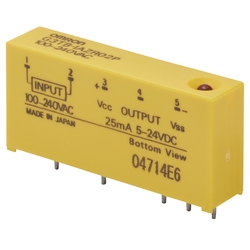(!)NOTE : Windows 7 users won’t be able to use some latest features of eCatalog/WOS since Microsoft is ending support for Windows 7 on 14 Jan, 2020. Please upgrade your system for uninterrupted services.
- Notice of End of Sales for Economy Series Pneumatic Equipment Category. More information.
SSR(Terminal shape:For Circuit Boards)
Brand |
|
|---|---|
| CAD |
|
| Days to Ship |
|
1 items
- Sort By
-
You can add up to 6 items per a category to the compare list.

OMRON
[Features]
· I/O solid state relay for logic circuit and load interface.
· Lineup features input module (AC/DC), output module (AC/DC), with each module distinguishable by color.
· RSS operations can be viewed with the operation display lamp.
· Withstand voltage between input and output 4,000V.- Volume Discount
Contact rated current (minimum value for AC and DC)(A) Application Terminal shape Dimension height(mm) Latch function Representative Standard Dimension width(mm) Dimension depth(mm) - SSR For Circuit Boards 20.5 ~ 30.5 - - 43.5 10 From: ₹ 624.00 Days to Ship: Same day  Same day
Same day
| Brand |
|---|
| Product Series |
| From |
| Days to Ship |
| Contact rated current (minimum value for AC and DC)(A) |
| Application |
| Terminal shape |
| Dimension height(mm) |
| Latch function |
| Representative Standard |
| Dimension width(mm) |
| Dimension depth(mm) |
You can add up to 6 items per a category to the compare list. | |
| Brand | OMRON |
| Product Series | |
| From | ₹ 624.00 |
| Days to Ship | Same day |
| Contact rated current (minimum value for AC and DC)(A) | - |
| Application | SSR |
| Terminal shape | For Circuit Boards |
| Dimension height(mm) | 20.5 ~ 30.5 |
| Latch function | - |
| Representative Standard | - |
| Dimension width(mm) | 43.5 |
| Dimension depth(mm) | 10 |
Loading...
Configure
Specification/Dimensions
-
Contact rated current (minimum value for AC and DC)(A)
-
Application
- Power
- SSR
-
Terminal shape
- Socket / plug-in
- For Circuit Boards
- Screw Fastening
-
Dimension height(mm)
-
Latch function
- NA
-
Representative Standard
-
Dimension width(mm)
-
Dimension depth(mm)
Related Categories to SSR
FAQ Solid State Relay
- Question: What is a Solid State Relay (SSR)?
- Answer: A Solid State Relay (SSR) is an electronic switching device that controls electrical loads without the use of moving parts. It uses solid-state components, such as semiconductor devices, to perform the switching function. SSRs are commonly used in automation and control systems to manage the flow of electrical currents.
- Question: What are the benefits of using SSRs over traditional relays?
- Answer: SSRs offer several advantages over traditional electromechanical relays. They are faster, have longer lifespans due to no moving parts, generate less noise, and are more resistant to wear and tear. Additionally, SSRs provide precise control, high reliability, and can switch rapidly without mechanical limitations.
- Question: What is a 220V Solid State Relay used for?
- Answer: A 220V Solid State Relay is used to control electrical loads that operate at or require a 220-volt power supply. These relays are commonly employed in various applications, including industrial machinery, heating systems, lighting controls, and other automation scenarios where precise switching of high-voltage loads is necessary.
- Question: How does a DC Solid State Relay differ from an AC Solid State Relay?
- Answer: The primary difference between a DC Solid State Relay and an AC Solid State Relay lies in the type of current they control. DC SSRs are designed to switch direct current loads, commonly found in electronics and low-voltage systems. AC SSRs, on the other hand, are designed for alternating current loads, making them suitable for a broader range of applications, including household appliances and industrial machinery.
- Question: What are the applications of a 3-phase Solid State Relay?
- Answer: A 3-phase Solid State Relay is specifically designed to control three-phase electrical loads. These relays find applications in industries where three-phase power is prevalent, such as in motor controls for pumps, fans, compressors, and other equipment. They are also used in heating systems, industrial ovens, and various automation setups requiring precise and reliable control of three-phase loads.






How can we improve?
How can we improve?
Thank you for your time.
Your feedback is essential for our continuous improvement
Privacy Policy
Thank you for your cooperation.
Thank you for your time.
Your feedback is essential for our continuous improvement
Please use the inquiry form.
Privacy Policy